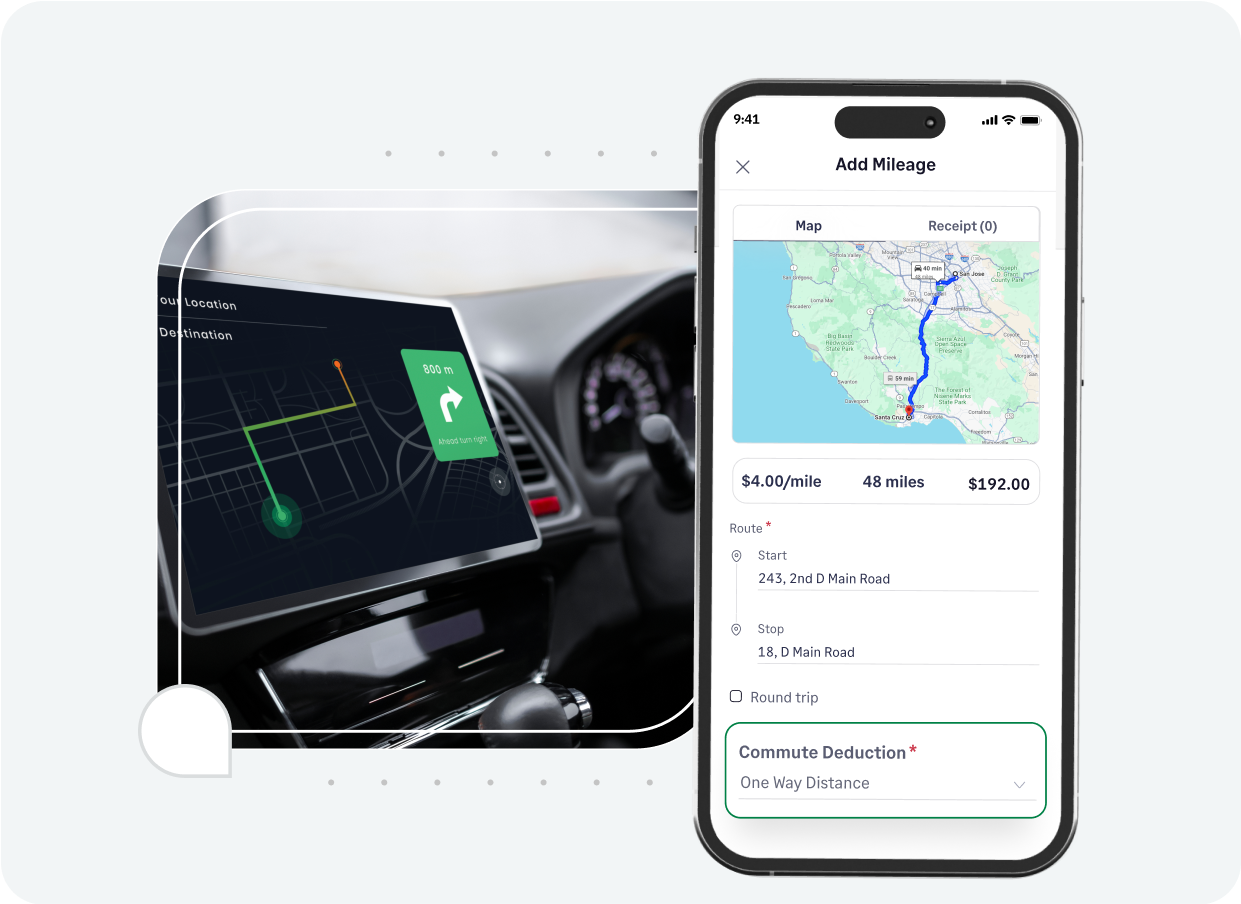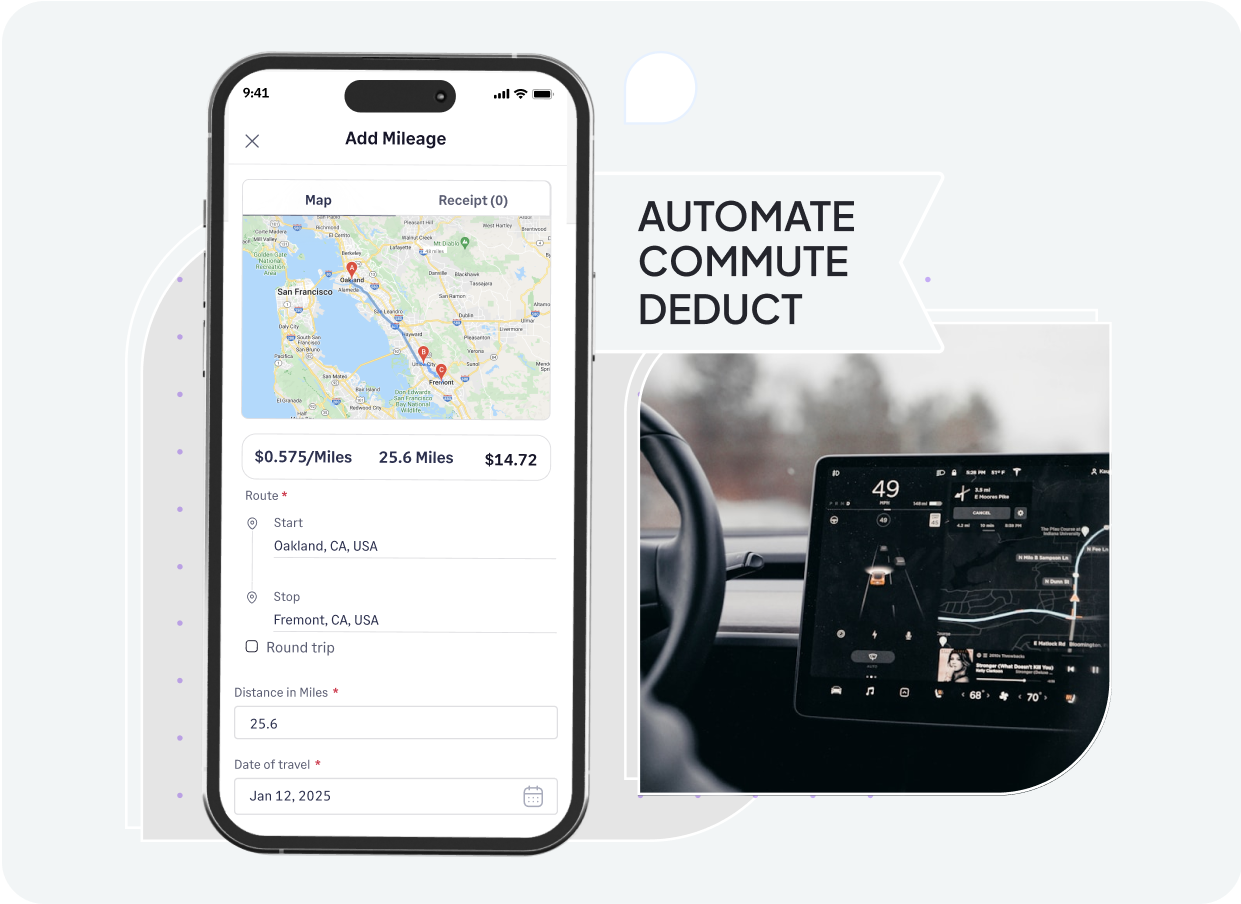For those driving their personal vehicles for work across Ohio, understanding mileage reimbursement is crucial.
Whether you're an employer structuring a fair policy or an employee seeking clarity on compensation, this guide covers typical mileage rates in Ohio, the state's relevant labor laws, and how Sage Expense Management can streamline the process of tracking and reimbursement.
Ohio Mileage Reimbursement Rate
When it comes to private employers, Ohio law does not mandate a specific mileage reimbursement rate. This means there isn't a state-legislated amount that companies must pay per mile for business-related travel.
Despite this, many Ohio businesses opt to use the standard mileage rates announced annually by the Internal Revenue Service (IRS). This is a widely adopted practice because:
- It offers a nationally recognized benchmark calculated to cover average vehicle operating costs, including fuel, maintenance, insurance, and depreciation.
- Reimbursements at or below the IRS standard business rate are generally non-taxable income for employees, provided proper records are kept.
- It provides a consistent and fair method for compensating employees for the use of their personal vehicles.
As of January 1, 2025, the key IRS standard mileage rates are:
- 70 cents per mile for business miles driven.
- 21 cents per mile for medical or moving purposes (note: the deduction for moving expenses currently applies only to active-duty members of the U.S. Armed Forces).
- 14 cents per mile driven in service of charitable organizations.
Here’s a look at the IRS standard business mileage rates over the past few years for context:
It's important to distinguish that the State of Ohio has its own mileage reimbursement rules and rates for state government employees, set by the Office of Budget and Management (OBM). These often align with or adopt the IRS rate but are not binding on private-sector businesses.
Ohio Mileage Reimbursement Calculator
Looking to estimate your mileage reimbursement? Our Ohio Mileage Reimbursement Calculator is designed to help.
Using the Ohio Mileage Reimbursement Calculator is simple:
- Choose the tax year for which you want to calculate your reimbursement. The calculator uses the IRS standard mileage rates for that year, as these are a common benchmark in Ohio.
- Input the total business miles driven. The calculator will then provide an estimated reimbursement amount, offering a useful figure for both Ohio-based employees and their employers.
Calculate
Results
Some Important Ohio Mileage Reimbursement Laws
While Ohio doesn't set a specific mileage rate for private companies, certain labor laws are critical to consider:
1. No State-Mandated Reimbursement Rate
Ohio law does not require private employers to reimburse their employees for mileage at a specific rate.
2. Ohio Minimum Wage Law is Key
This is the most significant legal consideration. Employers must ensure that any unreimbursed business expenses, including mileage for work-related use of a personal vehicle, do not cause an employee's effective hourly wage to fall below the applicable Ohio minimum wage.
- As of January 1, 2025, Ohio's minimum wage is:
- $10.70 per hour for non-tipped employees at businesses with annual gross receipts over $394,000.
- $5.35 per hour (cash wage) for tipped employees at these larger businesses, as long as tips bring their total hourly earnings to at least $10.70.
- $7.25 per hour (the federal minimum wage) for employees at businesses with annual gross receipts of $394,000 or less, and for 14- and 15-year-old employees.
- If unreimbursed driving costs effectively drop an employee’s earnings below these thresholds for their workweek, it could constitute a minimum wage violation under Ohio law and the federal Fair Labor Standards Act (FLSA).
3. Record-Keeping
Maintaining accurate and detailed records of business mileage (including dates, purpose of travel, and miles driven) is a best practice for:
- Employers: To accurately calculate any reimbursements they provide and to have documentation should questions arise regarding minimum wage compliance.
- Employees: To support reimbursement requests under company policy and for personal tax records if necessary.
Ohio Mileage Reimbursement Law vs Federal Law
Understanding how Ohio's regulations (or lack thereof for specific rates) compare to federal laws is important:
Federal Law (FLSA):
- The Fair Labor Standards Act does not explicitly mandate mileage reimbursement by private employers.
- However, it requires that unreimbursed business expenses (like mileage) do not reduce an employee's effective earnings below the federal minimum wage ($7.25 per hour).
Ohio State Law:
- No specific reimbursement statute: Ohio, similar to federal law, does not impose a specific mileage reimbursement rate on private employers.
- Tiered minimum wage protection: Ohio has its own minimum wage rates ($10.70/hour for larger employers, $7.25/hour for smaller ones in 2025). The critical factor is that unreimbursed expenses must not drop pay below these applicable state rates. For larger employers, this means Ohio law provides a higher wage floor than the federal minimum alone.
IRS Guidelines:
- These are federal tax guidelines, not laws forcing private employers to reimburse.
- They establish the standard rates at which mileage reimbursement is generally non-taxable to the employee. This is why many Ohio businesses adopt the IRS rates.
In Ohio, while employers have flexibility in setting their mileage reimbursement policies, they must be vigilant about the state's minimum wage laws to ensure unreimbursed travel costs don't inadvertently lead to violations.
How Sage Expense Management (formerly Fyle) Can Automate Mileage Tracking
Manually tracking mileage, whether for trips between Columbus and Cincinnati or daily routes within Dayton, can be time-consuming and error-prone. Sage Expense Management offers a robust, automated solution to help Ohio businesses manage mileage tracking and reimbursement with enhanced accuracy and efficiency.
- Easy and accurate mileage tracking: Our integration with Google Maps ensures every business mile is accurately logged. This provides reliable data for fair reimbursements and robust record-keeping for your Ohio operations.
- Support compliance with Ohio wage laws: With Ohio's tiered minimum wage, accurate expense tracking is vital. We help create clear, auditable records of mileage, supporting your efforts to ensure that total compensation, after accounting for vehicle use, meets or exceeds Ohio's minimum wage requirements.
- Save valuable time: Empower your employees to focus on their work, not on tedious logbooks. Our intuitive mobile app (iOS and Android) makes logging miles simple and can even track trips automatically. Employees can also submit expenses through everyday tools like Slack or Outlook, streamlining the entire process.
- Flexible for your company’s policies: Whether you choose to use the IRS standard rates or have a custom reimbursement structure, Sage Expense Management can be configured to match your Ohio business’s specific mileage policies.
- Seamless integration and quicker reimbursements: Connect Sage Expense Management with your existing accounting software (such as QuickBooks, Xero, NetSuite) for effortless data synchronization. For US-based companies, we also support direct ACH payments, ensuring your Ohio employees receive their reimbursements promptly.
- Efficient approval workflows: Automated approval processes and reminders keep mileage claims moving, preventing bottlenecks and ensuring timely payment for your team in Ohio.
Eliminate the hassle of manual mileage tracking. Discover how Sage Expense Management can bring accuracy, compliance, and significant time savings to your mileage reimbursement practices in Ohio.


































